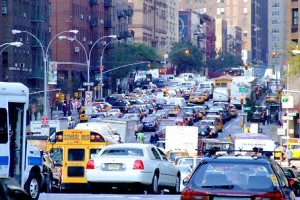Sure, your spouse may have lost their job in the economic downturn. The good news is that you’ve likely been spending less time in traffic, suggests a report from the Texas Transportation Institute at Texas A&M University.
Researchers have found that the amount of time motorists wasted in traffic tie-ups dipped by more than 10% from 2007 to the depths of the recession, a year later. But while figures for 2010 have yet to be calculated, it looks like American commuters are already starting to experience longer driving times as the economy recovers.
And that will translate into more money being wasted on fuel, especially as gasoline prices continue to rise.
In 2007, before the wholesale collapse of the economy, Americans wasted 5.2 billion hours in traffic, according to the Transportation Institute, which based its study on data gathered in 439 U,S, urban areas. In 2008, as Wall Stress melted down and unemployment soared in virtually every sector, the highways grew notably less crowded, the number of hours lost to traffic dropping to 4.6 million.
But a year later, as the economy began to recover, traffic tie-ups grew by roughly 5%, resulting in the loss of 4.8 billion hours.
That is, of course, an abstract number for someone creeping along in stop-and-go traffic. On a personal basis, it all added up to an extra 34 hours of driving time in 2009.
While Los Angeles might be the poster child – or city – for traffic snarls, the biggest problems show up in Washington, D.C. and Chicago, where motorists lost 70 hours a year in tie-ups.
As for the cost of all this wasted time, Texas A&M researchers put it at $115 billion for lost work time, added fuel and shipping delays. That’s about the size of the Ecuadorian, New Zealand and Iraqi economies, and only a third less than Ireland’s.
In terms of wasted fuel alone, traffic tie-ups consume as much gas and diesel as pumps through the Alaska pipeline in 130 days – 3.9 billion gallons annually.
As the economy continues to recover the figure is expected to continue to grow. And rising fuel costs will be an even more significant factor.
While there is “no rigid prescription” for solving the problem, acknowledged researcher Tim Lomax, the study did find that public transportation did help reduce the issue of traffic congestion. Reducing by an estimated 785 million hours the time Americans spent in traffic delays, while also saving 640 million gallons of fuel.

